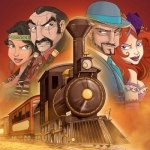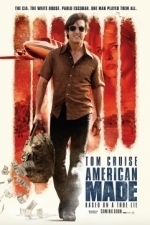
Off-Road Coach Bus Driving & Parking Simulator 18
Games and Entertainment
App
Get ready to enjoy the Off-road Coach Bus Simulation. Wonderful interiors, incredible vehicles will...

Thomas & Friends: Magic Tracks
Entertainment and Education
App
Play mini games and build your own magical train set in the ultimate Thomas & Friends™ adventure! ...
Lee (2222 KP) rated American Made (2017) in Movies
Aug 31, 2017
It certainly is an idea role for Cruise. Based on a true story, Cruise plays Barry Seal. Top pilot for TWA and bored of the same old routine day in, day out. When his co-pilot and passengers are all asleep during a flight, he relieves the monotony by faking some heavy turbulence in order to wake them all up, but it's not enough. So, when he's approached by CIA agent Schafer (Domhnall Gleeson) to work for them, flying exciting reconnaissance missions over South America, he jumps at the chance. And then during a refueling stop in Colombia, Seal is recruited by Pablo Escobar's drug cartel, who offer to pay him $2000 for each kilo of cocaine he can carry from Columbia to Louisiana. Then he begins flying guns from Arkansas to Nicaragua while still continuing the drugs runs. Seal finds himself with more money than he can spend, burying bags of it in his backyard and piling it up in wardrobes. He can't turn around without bumping into money, and all the while the stakes are getting higher, the potential consequences of his actions increasing.
Caught up in among all of this are Seals wife and kids. Finding themselves woken by him at 4am and being told they need to move home before their house is raided at 6am, before gradually adjusting to their new, increasingly expensive lifestyle. We never quite get to spend enough time with that part of Barry's life, taking a backseat instead to the roller coaster thrill seeking that he's got himself wrapped up in outside of home.
Cruise charms and grins his way through all of this perfectly. Obviously he did all of the flying scenes himself and he must have had a real blast making this movie. There's a good deal of humour throughout and the use of film grain, handheld cameras and Kodak style lighting help to give it a real 70s-80s feel to match the era it's set in. A fun, entertaining movie and a return to form for Mr Cruise!

Island Plane Flight Simulator
Games
App
Island Plane Flight Simulator real action flying airplane pilot game. Finally your wait is over so...

Colt Express
Games
App
The game officially transposed from Colt Express, the famous train robbery boardgame. Plot your...
BoardgameApp

Fly To Dubai
Travel and Productivity
App
It's Universal app list of all Direct Airlines to Dubai in all around the World also this...

Stobart Finder
Travel
App
Stobart Finder tracks all 2,500+ trucks in the Stobart fleet on a map - in real time! Stobart...

Garmin BlueChart® Mobile
Navigation and Weather
App
Plan & view routes on your iPad® or iPhone® with BlueChart® Mobile. Easily and wirelessly...


